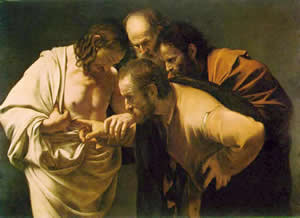2nd Sunday of Easter – Cycle B (Jn 20:19-31)

The Incredulity of Saint Thomas
In the spring of 1955, shortly before my 8th birthday, I was blessed by the Holy Spirit through the Sacrament of Confirmation. And, while I don’t recall the reason why, I chose Thomas as my Christian name. Looking back over more than fifty years I can honestly say that it must have been through the grace of the Holy Spirit because there could not have been a more appropriate name chosen.
Thomas, derived from the Aramaic, means twin, as does his Greek name, Didymus. While I have no twin by birth, I was born in June under the sign of Gemini, the Twins. I suspect that Thomas was a Gemini as well as we both seem to share the same or similar traits: moody, inquisitive, honest in belief yet slow to believe, logical and thoughtful, subject to despondency, obstinate, often disagreeable and quarrelsome. Peter even complained that Thomas was “mean, ugly, and always suspicious.” But the better his associates knew Thomas, the more they liked him; they found him superbly honest and unflinchingly loyal, perfectly sincere and unquestionably truthful. He was a natural-born faultfinder and a real pessimist. Man do I relate to St. Thomas!
I was born and raised in Missouri, the Show Me state. The state animal is the Missouri mule, representing the inherent stubbornness of its citizens. I am not sure how, but Thomas must have been a Missourian.
He earned the doubter name because he always looked on the gloomy side of things. He found it difficult to believe that Jesus had risen from the dead because he was not present when Jesus made his appearance on the evening of the resurrection. He said “Show me” just like any respectable Missourian would say! When one makes statements as vocal and as uncompromising as Thomas did, one must be prepared to eat crow. When Jesus appeared to him a week later, he was convinced not only that he had risen from the dead but that he was truly God. His hardheaded insistence on the facts resulted in the others calling him “doubting Thomas.”
Doubter though he was, a man slow to make up his mind, he was born with a thirst for honest inquiry and one who dearly loved a fact—yet once doubts were resolved, his loyalty was simple, fixed and unshakable. When Thomas saw nothing but disaster ahead, he was steadfast in his devotion to Jesus, more courageous than the other disciples. In John 11:16, when Lazarus had died and knowing that the Judeans had previously attempted to stone Jesus, Thomas said to the disciples, “Let us also go to die with him”. Although the disciples were afraid, they backed up Thomas and returned to Judea with Jesus.
Thomas’ willingness to follow Jesus to the death was commendable and true; his loyalty to Jesus has never been doubted. As Christians we should all be absolutely loyal to God and Jesus Christ.
While Thomas had a skeptical mind, he was a genuine seeker of the truth, for when proof of Jesus Christ’s resurrection was presented, Thomas believed. He asked questions because he sought the truth. Doubters, while lacking in faith, by expressing their doubts, express honesty—how many of us have daily or minute by minute doubts that we never express.
If we resemble Thomas in our own lives, surely that can give us hope that Jesus loves us and wants us to be his disciple as well. Too often it is easy to feel that Jesus only works with a certain kind of person. We must learn from Jesus to value diverse personalities and quirks and not to value only those people who are like us in every way. God created us as unique individuals for a reason, and we ought to appreciate their differences, even if we do not share the same quirks. Even though we have never seen our risen Lord, we should strive to make our faith in God and Jesus as strong and true as Thomas.
As St. Peter wrote, “Although you have not seen him you love him; even though you do not see him now yet believe in him, you rejoice with an indescribable and glorious joy, as you attain the goal of your faith, the salvation of your souls.”
